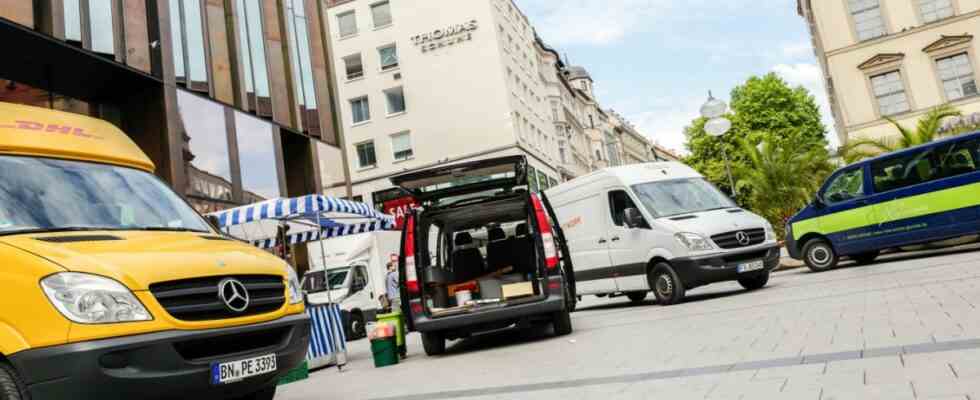A familiar street scene in any residential area of Munich: a DHL delivery van with hazard warning lights is parked at one intersection, a few meters away a GLS delivery man is double-parked while the Amazon messenger tries to pass by with his bus, only to find himself in front of the next house to stay in the second row as well. 50 meters further, at the next crossroads, it flashes again: Here another DHL messenger is unloading his van, while a tradesman is desperately looking for a parking space with his bus.
This or something similar can be observed every day, which is not surprising: According to the mobility department, Munich has the highest density of so-called CEP shipments of the four German cities with over a million inhabitants. The abbreviation stands for courier, express and parcel shipments, which have increased significantly in recent years. This not only causes stress for other road users, but also a lot of exhaust fumes in the residential areas. The city council now wants to take action and set the course for low-emission delivery traffic.
This Wednesday, the Mobility Committee wants to launch a plan for commercial transport as part of the Mobility Strategy 2035. Among other things, a logistics center for cargo bikes is to be built on the cattle yard site in the Isarvorstadt, or as the traffic planners put it: a “bike logistics hub”. The idea: At the central, covered location on Tumblinger Strasse, south of the new Volkstheater, various providers should reload their packages from larger trucks onto cargo bikes and take them to the residential area from there.
The city wants to set up its own pick-up boxes at subway stations
“If this pilot project is successful, we will extend it to other parts of the city,” says Nikolaus Gradl, spokesman for transport policy for the SPD/Volt parliamentary group. It is also planned to set up supplier-independent parcel boxes at underground stations where Munich residents can pick up their orders. “In the long term, we would like parcels to no longer be delivered in residential areas in diesel vehicles, but instead with emission-free electric vehicles or cargo bikes.”
UPS has been demonstrating that this principle works for almost six years in Munich – so far as the only provider. In July 2017, the company opened its first micro-depot for deliveries at Karl-Heinrich-Ulrichs-Platz in the Glockenbachviertel – an idea that has been implemented in Hamburg since 2012. In the meantime, the brown cargo e-bikes, in which the driver sits protected from the wind and rain, are a familiar sight. Over time, UPS has also continued to improve the bikes and make them more powerful. Now other providers are to be encouraged to rely on so-called cargo bikes.
The provider UPS has been using cargo bikes for almost six years, here in Obergiesing.
(Photo: Rene Hofmann)
In the pedestrian zone, employees of the company are also out and about with sack trucks.
(Photo: Stephan Rumpf)
However, parcel deliveries only make up part of Munich’s commercial traffic. The supply and disposal of the wholesale and retail trade, restaurants and hotels, supplying and performing craftsmen or freight transport represent other important segments of commercial traffic, according to the proposal for the city council. Here, too, solutions are needed, such as more parking space for delivery and tradesmen traffic. The city has already made a start. 33 new parking zones for commercial traffic are currently being created in the city center, and other districts are to follow.
In order to make it easier for commercial traffic, existing areas should also be used more effectively. It would be conceivable, for example, to open car parks for logistics purposes or as depot areas for craft businesses.
The combination of alternative delivery methods with new business models would offer better chances of successful delivery of goods than isolated individual measures. As one of several examples of such an innovative business model, the report cites an app that could allow businesses or private individuals to act as a provider-independent parcel shop.
Accepting foreign parcels – that should have become a habit for many during the corona pandemic anyway. So they could collect a little money for it in the future.

